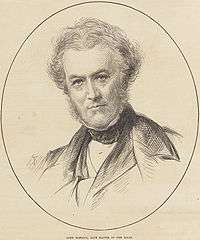John Romilly, 1st Baron Romilly
John Romilly, 1st Baron Romilly PC (20 January 1802 – 23 December 1874), known as Sir John Romilly between 1848 and 1866, was an English Whig politician and judge. He served in Lord John Russell's first administration as Solicitor-General from 1848 to 1850 and as Attorney-General from 1850 and 1851. The latter year he was appointed Master of the Rolls, a post he held until 1873. Knighted in 1848, he was ennobled as Baron Romilly in 1866.
The Lord Romilly PC | |
|---|---|
 Lord Romilly. | |
| Master of the Rolls | |
| In office 1851–1873 | |
| Monarch | Victoria |
| Preceded by | The Lord Langdale |
| Succeeded by | Sir George Jessel |
| Personal details | |
| Born | 20 January 1802 London, England |
| Died | 23 December 1874 (aged 72) London, England |
| Nationality | British |
| Political party | Whig |
| Spouse(s) | Caroline Otter (d. 1856) |
| Alma mater | Trinity College, Cambridge |
Background and education
Romilly was born in London, the second son of Sir Samuel Romilly and Anne, daughter of daughter of Francis Garbett, of Knill Court, Herefordshire. Frederick Romilly was his younger brother.[1] He was educated at Trinity College, Cambridge, and was called to the Bar at Gray's Inn, in 1827.[2]
Political and judicial career
Romilly first entered Parliament in 1832 as member for Bridport, holding the seat from 1832 to 1835 and again from 1846 to 1847.[3] In 1843 he became a Queen's Counsel. He was elected Member of Parliament for Devonport in 1847,[4] and was appointed Solicitor-General and knighted[5] in 1848 in Lord John Russell's administration, being promoted to Attorney-General in 1850. In 1851 he was appointed Master of the Rolls, and continued to sit for Devonport till the general election in 1852, when he was defeated.[4] He was the last Master of the Rolls to sit in Parliament. Romilly was raised to the peerage as Baron Romilly, of Barry in the County of Glamorgan, in 1866,[6] and retired from the mastership of the rolls in 1873. He did much to remove the restrictions which had long hampered research among the public records and state papers.
Notable judicial decisions
Notable judicial decisions of Romilly include:
- Norris v Chambres (1861) 29 Beav 246, 54 ER 621: whether an equitable lien could be claimed in immovable property overseas against a third party.
Family
Lord Romilly married Caroline Charlotte, daughter of the Right Reverend William Otter, in 1833. They had several children. She died in December 1856. Lord Romilly died in London on 23 December 1874, aged 72, and was succeeded in the barony his eldest son, William.[1] He is buried in Brompton Cemetery, London.
References
- thepeerage.com John Romilly, 1st Baron Romill
- "Romilly, John (RMLY818J)". A Cambridge Alumni Database. University of Cambridge.
- "leighrayment.com House of Commons: Bradford North to Brightside". Archived from the original on 25 June 2015. Retrieved 22 October 2010.
- "leighrayment.com House of Commons: Devizes to Dorset West". Archived from the original on 11 October 2017. Retrieved 22 October 2010.
- "No. 20858". The London Gazette. 19 May 1848. p. 1941.
- "No. 23050". The London Gazette. 19 December 1865. p. 6736.

External links
| Wikiquote has quotations related to: John Romilly, 1st Baron Romilly |
- Hansard 1803–2005: contributions in Parliament by John Romilly
| Parliament of the United Kingdom | ||
|---|---|---|
| Preceded by Sir Horace St Paul, Bt Henry Warburton |
Member of Parliament for Bridport 1832–1835 With: Henry Warburton |
Succeeded by Henry Warburton Horace Twiss |
| Preceded by Thomas Alexander Mitchell Alexander Baillie-Cochrane |
Member of Parliament for Bridport 1846–1847 With: Thomas Alexander Mitchell |
Succeeded by Thomas Alexander Mitchell Swynfen Jervis |
| Preceded by Henry Tufnell Sir George Grey, Bt |
Member of Parliament for Devonport 1847 – 1852 With: Henry Tufnell |
Succeeded by Henry Tufnell Sir George Berkeley |
| Legal offices | ||
| Preceded by Sir David Dundas |
Solicitor General for England and Wales 1848–1850 |
Succeeded by Sir Alexander Cockburn, Bt |
| Preceded by Sir John Jervis |
Attorney General for England and Wales 1850–1851 |
Succeeded by Sir Alexander Cockburn, Bt |
| Preceded by The Lord Langdale |
Master of the Rolls 1851–1873 |
Succeeded by Sir George Jessel |
| Peerage of the United Kingdom | ||
| New creation | Baron Romilly 1866–1874 |
Succeeded by William Romilly |
.svg.png)